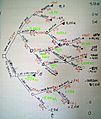Finance facts for kids
Finance is a study which figures out how people, businesses and groups make and use money. It can mean:
- Thinking about money
- Thinking about how to control money to make profit
- Studying how to take chances in projects that make money
- As a verb, "to finance" is to provide money for business.
Contents
Some simple finance ideas
The process of finance is learning how people and groups act in managing their money, and most of all how they manage making money, and making a profit, with spending money, or making a loss.
A group that makes more money than it spends can lend or invest the excess profit. On the other hand, a group that makes less money than it spends can raise money by getting a loan or selling stock, or spending less, or making more money.
A bank is where many people borrowing money meet people lending money. A bank gets money from lenders, and pays interest. The bank then lends this money to borrowers. Banks allow borrowers and lenders of different sizes to meet.
Corporate finance is about things like the sale of stock by a company to the public. Stock is ownership in a company, broken up into pieces. The stock gives whoever owns it part ownership in that company. If someone buys one share of XYZ Inc, and the company has 100 shares available, the buyer is 1/100th owner of that company and owns 1/100th (1%) of the profit.
Finance is used by people, by governments, by businesses, etc., as well as by all kinds of groups.
Personal Finance
This is finance for people. It is about:
- How much money will be needed by a person, now and when they get old.
- Where will this money come from (e.g. savings or borrowing)?
- How can people protect themselves against problems with money in their lives?
- How can family money be given to children and grandchildren?
- How do taxes affect money choices?
Business finance
Business finance is about finding money for a company's activities. It studies trying to make more profit than loss, and taking good risks for the chance to make more money.
Financial economics
Financial economics is the study of economics which is important to financial things like changes in price and supply of goods.
It studies how much risk some actions that a company may take will cause, and how the company should spend its money.
Financial maths
Financial maths is the study of maths for financial markets. Financial maths studies mathematics, mainly statistics.
- For facts about three areas in finance - company finance, money and investment management, see Prof. Aswath Damodaran
- For links to finance web sites see Web Sites for Discerning Finance Students, Prof. John M. Wachowicz-
- For the introductory finance web site at the University of Arizona, studyfinance.com
- For introductory articles on mathematical finance see quantnotes
- For introductory articles on behavioral finance see the BF gallery
- For introductory articles on financial analysis see Financial Analysis
- Learn how to practice good Financial Planning
Images for kids
-
Bond issued by The Baltimore and Ohio Railroad. Bonds are a form of borrowing used by corporations to finance their operations.
-
The floor of the New York Stock Exchange in 1908
-
Chicago Board of Trade Corn Futures market, 1993
-
Founded in 1602, the Dutch East India Company (VOC), started off as a spice trader, "going public" in the same year, with the world's first IPO.
-
President George W. Bush, speaking on the Federal Budget in 2007, here requesting additional funds from Congress
-
"The excitement before the bubble burst" – viewing prices via ticker tape, shortly before the Wall Street Crash of 1929
-
Crowds gathering outside the New York Stock Exchange after the Wall Street Crash of 1929
-
People queuing outside a Northern Rock branch in the United Kingdom to withdraw their savings during the financial crisis of 2007–2008
-
Decision trees, a more sophisticated valuation-approach, sometimes applied to corporate "project" valuations (and a standard in business school curricula); various scenarios are considered, and their discounted cash flows are probability weighted.
-
Courtyard of the Amsterdam Stock Exchange, 1653, the world's first formal stock exchange
-
Dōjima Rice Exchange, the world's first futures exchange, established in Osaka in 1697
See also
 In Spanish: Finanzas para niños
In Spanish: Finanzas para niños






















